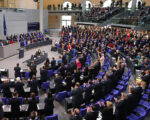>> Gay rights: GCHQ boss ‘sorry’ for historical ban
[spacer]
« Avoir interdit aux homosexuels de travailler au sein du “quartier général des communications du gouvernement” » (l’une des trois agences publiques de renseignement britannique, avec le célèbre MI6 et le MI5) « était une terrible erreur », a déclaré son actuel directeur, Robert Hannigan, lors d’une conférence organisée ce vendredi à Londres par l’association LGBT « Stonewall ».
Ces excuses ont été encouragées par un ancien espion, Ian, expulsé du service dans les années 1960, pour « présomption d’homosexualité » : « Je suis ravi aujourd’hui de pouvoir lui dire, ainsi qu’à toutes ces autres personnes qui auront été persécutées dans nos équipes jusque dans les années 1990 en raison de leur orientation sexuelle, à quel point je suis désolé », a indiqué Robert Hannigan. « C’est une perte considérable, quand on imagine tout ce qu’ils auraient pu nous apporter ou encore réaliser ». Et citant l’exemple du mathématicien et cryptologue Alan Turing, père de la science informatique et visionnaire de l’intelligence artificielle, il a estimé que son service n’avait malheureusement toujours pas « tiré les leçons » de la manière « effroyable » dont l’homme avait été traité. Et, « ce n’est parce que la “pratique” est devenue “courante” au fil des décennies, reflétant ainsi l’intolérance des temps et les pressions de la guerre froide, que la chose soit moins grave : Nous devons nous en excuser ! »
En dépit de sa contribution exceptionnelle qui a permis de briser les codes utilisés par l’armée allemande et fait basculer l’histoire de la seconde guerre mondiale, Alan Turing a été condamné en 1952 par la justice anglaise pour « indécence manifeste » parce qu’il était homosexuel ! Et pour éviter la prison, il fut contraint à une « castration chimique », après avoir notamment subi une véritable chasse aux sorcières au sein même du GCQH, malgré le soutien inconditionnelle de ses plus proches collègues. Brisé, il mettra fin à ses jours deux ans plus tard, selon la version officielle, en croquant une pomme macérée dans du cyanure.
En janvier dernier, Stonewall désignait déjà le MI5 comme « le meilleur employeur de Grande-Bretagne pour le respect de la diversité sexuelle ». Désormais, a insisté Robert Hannigan, « le GCQH peut se targuer de reposer sur des individus qui osent être différents ».
Terrence Katchadourian
stophomophobie.org
[spacer]
>> Not letting gay people work for GCHQ until the 1990s was wrong and was the “nation’s loss”, the UK intelligence agency’s boss Robert Hannigan has said.
He also said the treatment of gay computer pioneer and code breaker Alan Turing had been “horrifying”.
GCHQ now relies on people who “dare to be different”, he told a conference hosted by gay rights group Stonewall.
Mr Hannigan said no-one could know what some of those sacked for being gay would have gone on to achieve.
In his speech in London, Mr Hannigan said a former spy he called Ian, who was forced out of the service on suspicion of being gay in the 1960s, had urged him to apologise.
“I am happy to do so today and to say how sorry I am that he and so many others were treated in this way, right up until the 1990s when the policy was rightly changed,” he said.
“The fact that it was common practice for decades reflected the intolerance of the times and the pressures of the Cold War, but it does not make it any less wrong and we should apologise for it.
“Their suffering was our loss and it was the nation’s loss too because we cannot know what Ian and others who were dismissed would have gone on to do and achieve. We did not learn our lesson from Turing.”
Despite his pivotal and groundbreaking work breaking codes during World War Two – the story of which was told in the 2014 film The Imitation Game staring Benedict Cumberbatch – Turing was hounded by GCHQ over his sexuality.
In 1952 he faced a conviction for gross indecency following which he was chemically castrated. He had been arrested after having an affair with a 19-year-old Manchester man.
The conviction meant he lost his security clearance and had to stop the code-cracking work.
In 1954 he took his own life by eating an apple laced with cyanide, and in 2013 he received a posthumous royal pardon.
“In the horrifying story of his treatment, a small ray of light is that he was not abandoned by all of his colleagues at GCHQ – many stood by him,” Mr Hannigan said.
He said GCHQ now relies on people who “dare to think differently and be different” and that included hiring spies on the autistic spectrum, with Asperger’s or other syndromes, who he described as “precious assets”.

















